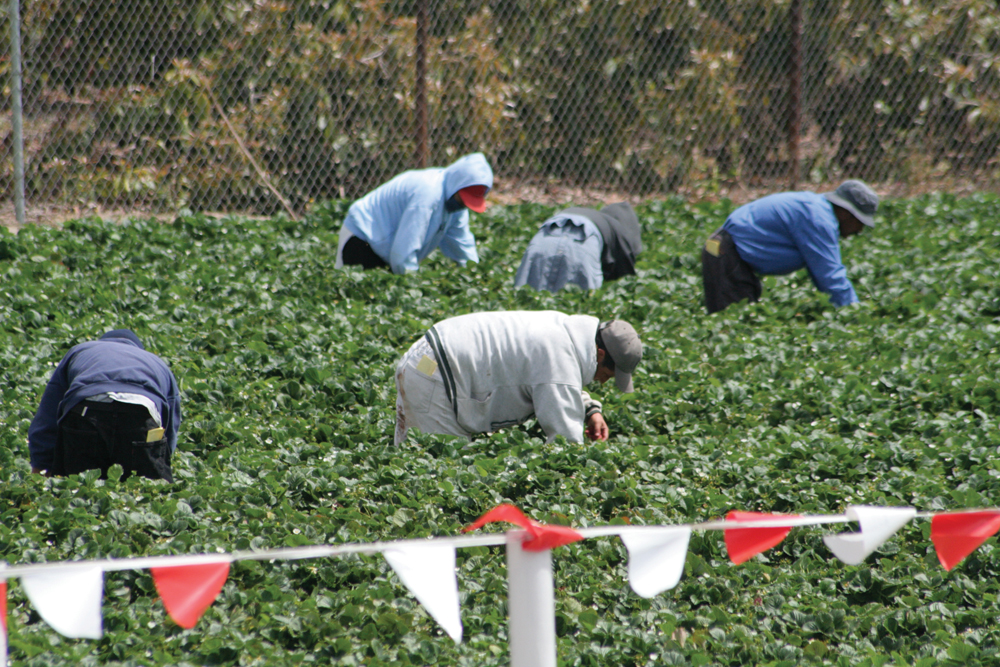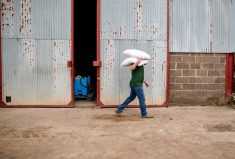Two Manitoba farmers say the media has misrepresented the situation of international workers and the farmers who hire them.
“All of us employers are trying really, really hard to keep these guys safe because we depend on them, and they depend on us,” said Sam Connery, who farms near Portage. “They depend on us for this job so that they can support their families back home.”
Despite government-mandated quarantine and safety measures, hundreds of temporary foreign workers in Ontario have fallen ill with COVID-19. Three men from Mexico have died.
Read Also

AAFC organic research program cut
Canada’s organic sector says the loss of a federal organic research program at Swift Current, Sask., will set the industry back.
In June, 18 temporary foreign workers in Manitoba were placed in isolation after one of them fell ill with COVID-19. Four cases of the virus were linked to that unnamed business. The workers have since recovered.
Advocates say COVID-19 has increased the vulnerability of temporary foreign workers, and have called for reform.
Prime Minister Justin Trudeau weighed in on the situation in June. He was quoted in the Globe and Mail as saying, “We could also look at pathways to citizenship that could give people more rights… We should always take advantage of moments of crisis to reflect: Can we change the system to do better?”
Why it matters: COVID-19 has thrust farmers and temporary foreign workers into the spotlight, and sickness and death among those workers is a black eye on the agricultural community whether it likes it or not.
Migrant workers and other non-permanent residents protested in cities across Canada, calling for greater rights and protections, according to a July 4 report from Global News.
The article quotes Syed Hussan, executive director of Migrant Workers Alliance for Change as saying, “Our people are literally starving. People are dying, not even to grow food, but to grow flowers and grapes for wine. Domestic workers are trapped in homes by employers who won’t let them out because migrants are seen as carriers of disease.”

These reports paint most farmers unfairly, said Paul Gregory. The media equates hiring international workers to “modern slavery and all this bulls—t,” which it simply isn’t, he said.
Gregory, who owns a beekeeping and seed-farming operation near Fisher Branch, usually employs seasonal workers from the Philippines. This year those workers didn’t come because of logistical challenges related to COVID-19.
He said his workers don’t work unreasonable hours, and they can and do change farms from year to year if they’re not happy.
His workers live in houses, he said. They’re older, but clean and decently kept. These are inspected every year by the Office of the Fire Commissioner.
These workers also send money home and contribute to their communities, he said.
About $337 million in remittances are sent home by SAWP employees every year to 12 countries, according to the Canadian Horticultural Council.
Gregory added if seasonal workers became permanent residents or citizens, they’d soon need to look for other work as farmers and beekeepers can’t promise them year-round work. Farmers would then need to bring in more workers to fill those labour gaps.
On her farm, said Connery, the men live in houses. Because of COVID-19 regulations, they each have their own bedroom, otherwise they’d share the room with one other man.
When the workers arrived, they had to quarantine for two weeks and follow strict cleaning protocols within the houses, said Connery. She arranged for Sobeys to deliver groceries once a week, and if the men forgot anything, she or other farm staff would go get those things.

The workers have Wi-Fi access in their homes, but couldn’t leave.
“I’m sure it was very boring and tedious for them,” she said. “(But) everyone was pretty good about it.”
Once the two weeks were up, the men were able to go out to work. They work in their house groups, and aren’t allowed to go within six feet of other house groups or Canadian workers.
Each house group has a dedicated van for their use. During asparagus season, each house group had its own asparagus “buggy.”
The workers stay on farm, said Connery, because now they can only get sick from community transmission.
The workers would often make grocery night takeout or pizza night, so Connery has tried to compensate by giving them takeout menus and going to pick up food for them once a week.
There’s a doctor in town who speaks Spanish, Connery said. One worker had a sore leg this year. He consulted with the doctor by phone, but when the injury didn’t heal, was able to go into town for treatment.
They have bilingual staff on farm to help the men navigate the rules, online banking, or technology.
“I know it’s definitely been tough, but I’m fairly happy with how well we were able to handle it,” Connery said.
Certainly not all farmers mistreat their workers, said Pablo Godoy, western regional director with UFCW, a union that also advocates for migrant farm workers, but Manitoba farms aren’t exempt from issues.
In Manitoba, those issues include accessing health care. Workers have told UFCW that they don’t know where to go if they get sick, or that their boss would rather not take them to the hospital.
The most common complaint is housing — that it’s dirty, run down, or crowded.
“People often say things like, ‘well the workers don’t complain, so there must not be anything wrong.’ And that’s not necessarily a given,” Godoy said. “People are terrified of losing their position in the program, which drastically alters a person’s ability to live or their living standards back home.”
Godoy said UFCW has heard of several employers who have not honoured COVID-19 safety measures (he did not specify that they were in Manitoba), including workers who sent the union a video of an employer telling them COVID was “not that big of a deal” and that they needed to keep working as long as they’re “not that sick.”
“The best letters on paper don’t mean anything without real enforcement,” said Godoy.
Godoy said UFCW hopes that review will bring about better-enforced accountability. Specifically, UFCW wants to see an independent, third-party review process where workers can file complaints without fear of being sent home.
“I think that… would be a good thing for the farmers and the farmers who do treat their workers well because if we can identify all the ones who don’t, then the conversation will be less about how bad a lot of the farmers are,” Godoy said.
Gregory said he’d be open to more accountability in the program. “What are we hiding?”
Connery said Manitoba farms are getting inspected, and that Service Canada had audited them early in the season to ensure they were complying with COVID-19 safety regulations.
Otherwise, it’s common to get audited about once every three years, she said.
In Manitoba, Workplace Safety and Health enforces occupational health and safety laws and inspects workplaces, including those that employ temporary foreign workers, a provincial spokesperson said in an emailed statement.
There is no required frequency for these inspections, the spokesperson said.
“With respect to COVID-19, Manitoba’s occupational safety and laws require employers to conduct a risk assessment and implement reasonable control measures to reduce risk to workers. Control measures may include implementing safe work procedures, administrative controls or the use of personal protective equipment as is reasonably practicable.”
















